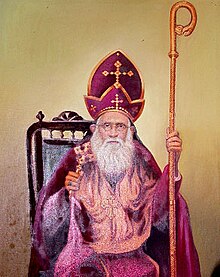Antonio Francisco Xavier Alvarez
| Antonio Francisco Xavier Alvares or Alvares Mar Julius | |
|---|---|
 |
|
| First Metropolitan of Goa and Ceylon | |
| Born |
24 April 1836 Verna, Goa, Portuguese India |
| Died | 23 September 1923 (aged 87) Ribandar, Goa, Portuguese India |
| Venerated in | Syrian Orthodox Church - |
| Major shrine | St. Mary's Orthodox Syrian Church, Ribandar, Goa |
| Feast | 23 September |
| Patronage | Poor and Ill |
|
Ordination history of Alvares |
|||||||
|---|---|---|---|---|---|---|---|
|
|
|||||||
|
|||||||
| Episcopal succession | |
|---|---|
|
Bishops consecrated by Alvares as principal consecrator
|
|
| Joseph René Vilatte | 29 May 1892 |
Antonio Francisco Xavier Alvares (Alvares Mar Julius, Julius Mar Alvarez) (29 April 1836 – 23 September 1923) was initially a priest in the Roman Catholic Church in Goa. He converted to the Syrian Orthodox Church and was elevated to Metropolitan of Goa, Ceylon and Greater India in the Malankara Syrian Orthodox Church.
Alvares was born to a Goan Catholic family in Verna, Goa, Portuguese India.
Alvares was appointed by the Archbishop of Goa to minister to Catholics in British India. The Portuguese Crown claimed these territories by virtue of old privileges of Padroado (papal privilege of royal patronage granted by popes beginning in the 14th century). The more modern Popes and the Congregation for the Propagation of the Faith separated these areas and reorganised them as apostolic vicariates ruled by non-Portuguese bishops, since the English rulers wished to have non-Portuguese bishops.
Successive Portuguese governments fought against this, terming this as unjustified aggression by later Popes against the irrevocable grant of Royal Patronage to the Portuguese Crown, an agitation that spread to the Goan patriots, subjects of the Portuguese Crown.
When, under Pope Pius IX and Pope Leo XIII, the hierarchy in British India was formally reorganised independently of Portugal but with Portuguese consent, a group of pro-Padroado Goan Catholics in Bombay united under the leadership of Dr. Pedro Manoel Lisboa Pinto and Alvares as the Society for the Defense of the Royal Patronage and agitated against the Holy See, the British India government and the Portuguese government in opposition to these changes.
...
Wikipedia
